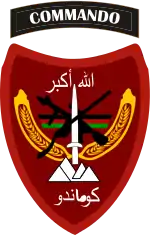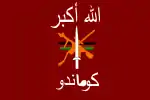Afghan National Army Commando Corps
The Afghan National Army Commando Corps (formerly ANA Commando Brigade;[5] ANA Commando Battalion[4]) was a commando force of the Afghan National Army (ANA). During the Taliban insurgency, the commandos comprised 7% of the Afghan National Security Forces but conducted 70% to 80% of the fighting.[6] The unit structure was based on the 75th Ranger Regiment.[7]
| Afghan National Army Commando Corps قول اردوی عملیاتهای خاص | |
|---|---|
 Insignia of the Afghan National Army Commando Corps | |
| Active | 24 July 2007 – 15 August 2021 |
| Country | |
| Branch | Afghan National Army |
| Type | Commando |
| Role | Close-quarters combat Counter-insurgency Counterterrorism |
| Size | 21,000 commandos (2017)[1][2] 30,000 commandos (2021)[3] |
| Part of | ANA Special Operations Command |
| Headquarters | Rish Khor camp (Camp Morehead), Kabul Province, Afghanistan[4] |
| Motto(s) | Khoda, Watan, Wazifa |
| Engagements | War in Afghanistan (2001–2021) |
| Commanders | |
| Current commander | Sami Sadat |
| Insignia | |
| Corps flag |  |
After the Fall of Kabul and the collapse of the ANA and Islamic Republic of Afghanistan, the Commandos have been virtually dissolved.
Selection and training
The first Commando battalion was formed from existing infantry battalions. In early 2007, a program began to take one conventional infantry kandak (battalion) from each of the regional ANA corps, give them special training and equipment, and reorganize them based on the 75th Ranger Regiment of the United States Army. Each battalion was assigned to one of the six regional corps.
Training was conducted at the Morehead Commando Training Center (Rish Khor camp), a longtime former Afghan Army installation located ten kilometres (six miles) south of Kabul. The camp was reported as being in either Wardak Province or Kabul Province.[8]
The 12-week course ran three separate training programmes for different parts of the nascent unit at the same time. The primary and bulk of the training was geared for the infantry toli (company), with a focus on individual skills and small unit tactics. To support the fighting companies, the Headquarters and Headquarters Toli received other training such as in mortars, medical care, and communications. The third section focused on the kandak staff, and their command and control functions.[9]
The unit recruits from all over Afghanistan from various Afghan Army units, taking in prospective Pashtuns, Tajik, Hazara, Uzbek and Turkmen to prevent forms of tribal allegiance and bias.[7]
The first Commando Kandak graduated on July 24, 2007, with Col. Fareed Ahmadi as the kandak commander.[10] Upon graduation, each Commando Kandak returned to its designated corps area along with an embedded U.S. Army Special Forces A-Team, and began going through an 18-week cycle: six weeks each of train-up, missions and recovery. 3rd Special Forces Group and 7th Special Forces Group rotated responsibility to train and advise in Afghanistan.[11]
While the original International Security Assistance Force plan was for one Brigade with six Kandaks (Battalions), the ANA had originally wanted a full division with three Brigades and 15 Kandaks.[12]
After the fall of Kabul in 2021
During the 2021 Taliban offensive, 22 Commandos were executed by the Taliban in the Faryab Province after surrendering.[13] While the Taliban were known to show leniency to normal ANA troops, Commandos and Air Force pilots were especially targeted by the Taliban.[14]
Some remnants of the ANA regrouped in the Panjshir Valley, where they joined the anti-Taliban National Resistance Front of Afghanistan. Around 500–600 remaining Afghan troops, made up mostly of Afghan Commandos, were reported to have refused to surrender to the Taliban in Kabul, and instead joined up with US forces in at Kabul International Airport, helping them secure the outer perimeter of the airport during the evacuation in August 2021. According to Pentagon spokesman John Kirby, the US will evacuate these remaining Afghan troops to safety if they wish to leave Afghanistan when the evacuation operation ends.[15]
Notes
- "U.S. Special Forces train Afghans in own image, success could lead to troop withdrawals in region". NY Daily News. 2010-08-08. Retrieved 2013-05-10.
- "Special Operations: Afghans Create A-Teams". Strategypage.com. 2010-05-23. Retrieved 2013-05-10.
- "Former US-Trained Afghan Commandos Recruited by Russia, Iran".
- "Afghan National Army update, May 2011 | FDD's Long War Journal". www.longwarjournal.org. May 9, 2011.
- "Archived copy" (PDF). Archived from the original (PDF) on 2016-07-10. Retrieved 2018-04-16.
{{cite web}}: CS1 maint: archived copy as title (link) - Cooper, Helene (2017-08-20). "Afghan Forces Are Praised, Despite Still Relying Heavily on U.S. Help". The New York Times. ISSN 0362-4331. Retrieved 2017-09-23.
- Neville 2019, p. 59.
- USA Today, France to withdraw 200 special forces from Afghanistan
- US Department of Defense, Gates Visits New Afghan Commando Training Site
- Npr.org, New Afghan Commandos Take to the Frontlines
- "Afghan commandos emerge - World news - Washington Post | NBC News". MSNBC. 2008-04-18. Archived from the original on 2008-04-20. Retrieved 2013-05-10.
- "ANA Commandos First on the Ground in Marjah | ISAF - International Security Assistance Force". Isaf.nato.int. Archived from the original on 2013-03-09. Retrieved 2013-05-10.
- Anna Coren, Sandi Sidhu, Tim Lister and Abdul Basir Bina (13 July 2021). "Taliban fighters execute 22 Afghan commandos as they try to surrender". CNN. Retrieved 2021-10-19.
{{cite web}}: CS1 maint: multiple names: authors list (link) - Stewart, Phil; Ali, Idrees; Shalizi, Hamid (2021-07-09). "Special Report: Afghan pilots assassinated by Taliban as U.S. withdraws". Reuters. Retrieved 2021-10-19.
- Regencia, Tamila Varshalomidze,Usaid Siddiqui,Ted (25 August 2021). "Biden keeps to August 31 deadline for Kabul airlift". www.aljazeera.com.
{{cite web}}: CS1 maint: multiple names: authors list (link)
References
- Neville, Leigh (2019). The Elite: The A–Z of Modern Special Operations Forces. Oxford: Osprey Publishing. ISBN 978-1472824295.